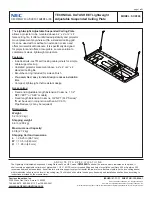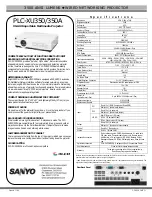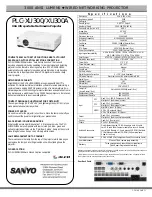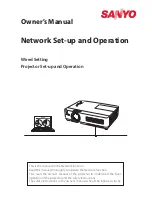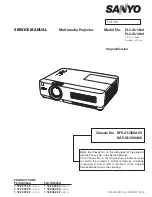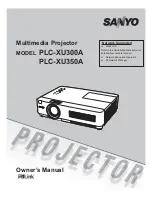
Section 3: Operation
Roadie HD+35K User Manual
3-35
020-100340-02 Rev. 1 (01-2010)
3D Stereo Sync Locking
. Not available in this projector. May be shown as "Reserved".
3D Stereo Sync Select
. Not available in this projector. May be shown as "Reserved".
3D Stereo Sync Delay
. Not available in this projector. May be shown as "Reserved".
Frame Lock Enable
. This option allows the projector to control the output frame timing based on the input
signal. The
Locked
option forces (if possible) the output image to be phase locked to the input frames.
Rate
Matched
means that the output runs at close to the input frequency , but is not locked to it so the output will
drift in phase relative to the output.
Free Run
forces the output to run at a 60Hz frame rate.
Warp Latency
. Requires optional Christie TWIST module. See
Christie TWIST
User's Manual provided with
the module.
Advanced Image Settings Secondary Menu
Motion Filter.
This control is most useful for smoothing out moving images from interlaced
sources. In most cases the proper
Motion Filter
setting is automatically determined according
to the type of incoming source signal. However, if your source is noisy and/or inconsistent, you
may wish to "force" a setting to ensure stable processing for this source. If desired, override the
default "Auto" setting by selecting the appropriate motion filter:
1.
Auto:
The projector automatically uses the correct motion filter according to the incoming signal.
2.
Still:
For static images with no motion, such as graphics from a CD.
3.
Motion
: For video images that did not originate from film, or for moving computer-generated images.
4.
Film
: For video images that originated from film. This will optimize image quality and stability.
Film Mode Threshold
. This setting determines how sensitively the projector can detect if an incoming video
signal originated from film or not.
Detail Threshold
. Use "Detail Threshold" to define at what frequency level the "Detail" control will begin to
magnify high frequencies, which adds details back into the image. Raise the threshold to ignore more of these
high frequencies, and lower the threshold to magnify more of these frequencies. A setting of "0", for example,
means no noise is ignored and all is magnified. An ideal detail threshold is one in which high frequencies that
are causing objectionable noise are not magnified when using "Detail", but frequencies which can help sharpen
an overly-soft image are magnified when using "Detail".
3.7
Using Inputs and Channels
NOTE:
Refer to
Section 2 Installation and Setup
, for a full explanation of how to connect sources to the
projector.
The projector stores and automatically recalls up to 99 different channels (source setups) for a variety of
inputs. This memory feature allows you to define and conveniently use a wide variety of customized setups
rather than having to repeatedly re-configure the projector for different presentations. Depending on what you
have defined, each physical source connection (i.e., input source to the projector) can have several different
channels associated with it.
3.7.1 Do I Select an Input or a Channel?
An
Input
is a source physically connected to the projector. Inputs 1 to 6 describes the source signal according
to which input slot (side panel) it is connected.
Summary of Contents for Roadie HD+35K
Page 1: ...Roadie HD 35K U S E R M A N U A L 020 100340 02 ...
Page 2: ......
Page 3: ...Roadie HD 35K U S E R M A N U A L 020 100340 02 ...
Page 66: ......
Page 160: ......
Page 166: ......
Page 182: ......
Page 190: ......
Page 191: ......
































